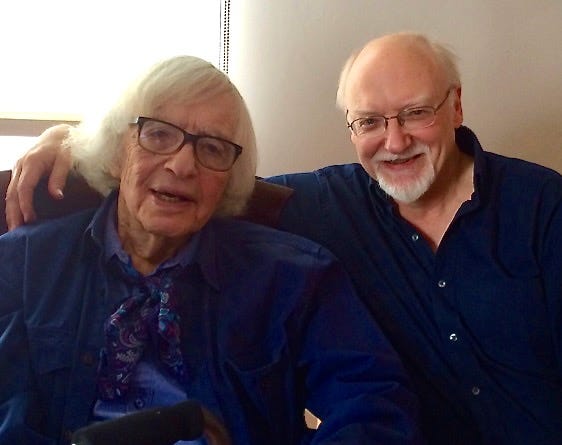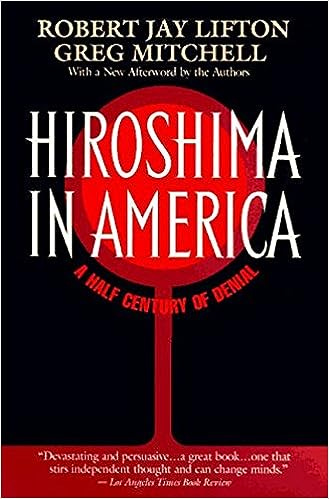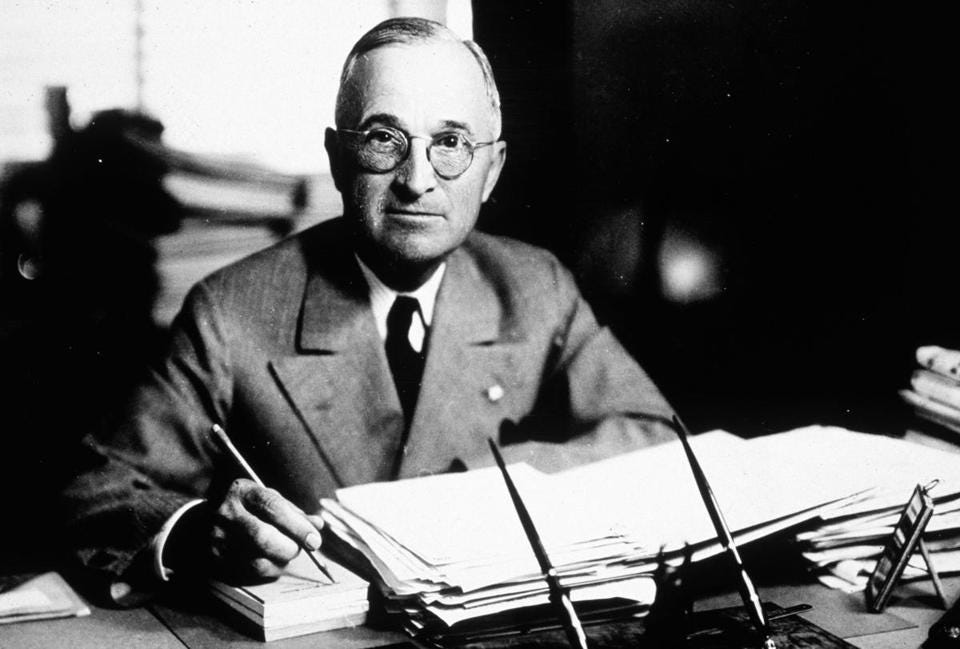Greg Mitchell is the author of a dozen books, including “Atomic Cover-up,” the recent award-winning “The Beginning or the End: How Hollywood—and America—Learned to Stop Worrying and Love the Bomb,” and (with Robert Jay Lifton) “Hiroshima in America.” He has directed three documentary films since 2021, with “Atomic Cover-up” coming to PBS this November. He has written widely about the atomic bombings, and their aftermath, for over forty years.


I was pleased to see that “Fresh Air” on NPR re-aired most of its 1995 interview with my longtime friend and co-author on two books and many articles, the great Robert Jay Lifton. We first met exactly 40 years ago when I was the editor of Nuclear Times magazine and coaxed him to write a piece for us. I knew him from his National Book Award winner on Hiroshima survivors, Death in Life, of course. A few years later he hired me to help run his Center for Human Survival in NYC and we also began a long annual tradition of attending baseball games between my Mets and his boyhood hometown (going back to Brooklyn) Dodgers.
Oh, we then wrote together a classic bestseller Hiroshima in America in 1995, and a few years later, Who Owns Death?, on capital punishment in the U.S. Remained friends ever since and he is still going strong at 97, with another book coming next month, Surviving Our Catastrophes.
Below is the transcript of the “Fresh Air” excerpt (which unfortunately did not ID yours truly as co-author of Hiroshima in America). Note: You can still subscribe to this newsletter for free and thanks to the many who have.
ROBERT JAY LIFTON: The myth is - which is the official American narrative of Hiroshima - that we dropped the bomb reluctantly after great reflection only in order to save lives and end the war, and that therefore it was a good and necessary thing and that we should not in any way trouble ourselves over it.
TERRY GROSS: You trace in your book "Hiroshima In America" the beginning of the official version of the story of the atom bomb and why we dropped it on Hiroshima to a press release after the bomb was dropped.
LIFTON: Probably the most important part of the press release is the first sentence, which reads, “16 hours ago, an American airplane dropped one bomb on Hiroshima, an important Japanese army base. And then it goes on to say, that bomb had more power than 20,000 tons of TNT. It goes on to say, the Japanese began the war from the air at Pearl Harbor. They have been repaid manyfold, and the end is not yet. Only in the third paragraph does it say, it is an atomic bomb. It is a harnessing of the basic power of the universe. The force from which the sun draws its powers has been loosed against those who brought war to the Far East.
GROSS: What is so significant about the first sentence that you read about Hiroshima being an important military base?
LIFTON: Well, what's significant about that first sentence is that it's a partial truth, and that is - that really matters. Because it's true - there was a Japanese military base in Hiroshima. It was a staging area for Southeast Asia and an important one. But there was also a city of 300,000 people, and the bomb was aimed at the center of the city. It was targeted on civilians, and it was meant to destroy the city. But the press release presented it as a strictly military action, and it blamed, more or less, the Japanese for this particular event. Now, again, the Japanese bear some blame because they did initiate the war, but it's a way of exonerating America and completely militarized what was really an attack on a whole city.
GROSS: Do you have information that leads you to believe that we could have had a peace with Japan, that Japan would have surrendered had it not been for the atom bombs?
LIFTON: There's a lot of evidence of a very good possibility that Japan would have surrendered if an effort at negotiation was initiated by us or responded to by us with the condition that the emperor be maintained. That isn't just an impression that I have, or that such leading historians as Barton Bernstein and Martin Sherwin and Gar Alperovitz have — many others as well. Almost any historian who studies these materials comes to that sense of it being at least a very good possibility. And it was stated so among Truman's advisers.
For instance, Joseph Grew, who was acting secretary of state during part of that period and who knew Japan well, strongly advocated that we look into precisely that kind of negotiation because he thought that maintaining the emperor was the only condition that the Japanese were holding to. And by not doing that, we strengthened the hand of the more fanatical Japanese who didn't want to surrender under any conditions. And that position won over John McCloy, who was one of Stimson's closest advisers and also presented it to President Truman. So at the very top of Truman's advisory group, there was that advocacy and that position. Ironically, one of the things that held them back was waiting for the atomic bomb to be finished and to be ready.
GROSS: Why do you think a second weapon was used at Nagasaki?
LIFTON: Well, a second weapon was really part of the first order, to use available atomic bombs, or atomic bombs as they became available. So one could have used an endless number of bombs according to that order. And that's the way a military order can be given to have that kind of momentum still in the midst of a bloody war. However, there could have been an order to stop, to interfere and prevent the use of that second bomb. It was not given.
And sadly, the second bomb was completed and dropped so quickly that most observers now feel that the Japanese hardly had sufficient time to consider a surrender in between the use of those weapons. There was some impulse to use that second bomb because there was also curiosity about what it could do. It was a different kind of bomb from the uranium bomb used on Hiroshima. It was a plutonium bomb of a different kind and of one that was considered to be highly important for the military future. And that could well have been a factor in carrying out the use of that second bomb or not interrupting that momentum of its use.
GROSS: President Truman is considered the buck-stops-here president, the president who was very decisive, who felt that the use of the bombs in Japan were justified and necessary to end World War II and save American lives. He, I think, has said that he never lost any sleep over the decision.
LIFTON: President Truman made many such statements that he never lost any sleep, that he made a clear-cut decision. But he made those statements in a very agitated way. He spent 25 years of the remainder of his life after having made that decision constantly defending it. And he said very different things. He sometimes said it was just like an artillery weapon — when you have it, you use it. At other times, he said it was an awesome weapon that should never be used because it kills women and children indiscriminately. He had those dual feelings about the weapon.
But you have to weigh all of these elements as you come to some kind of psychological profile of this man who was inherently decent and struggling to carry through his responsibility as a wartime president as well as he could. He was afraid not to make a decision to use the weapon. It was wartime. It was a bloody war. Americans were enraged at the Japanese. Would they have excused him if he didn't use that weapon? As Byrnes said, his secretary of state, he might be crucified by the American people and the victim of an overwhelming congressional investigation if the weapon hadn't been used - an investigation of what had happened to that $2 billion used on that project, a really unprecedented sum at that time. So ironically, one can use a weapon like that because one is afraid not to use it.
GROSS: Getting back to what you describe as the myth that we've been told and that we've perpetrated about our use of the bombs in Hiroshima and Nagasaki - so the myth says that we reluctantly, after great reflection, dropped the bombs. You also say that Truman's style, the buck-stops-here style, was a style that really discouraged great reflection.
LIFTON: That's right. It's impossible to undergo great reflection when you're impelled toward quick and immediate decision, often before all of the elements of the problem are clear. That makes it very hard for even one's advisers to lay out all of the considerations that one should look at in making such a decision. There wasn't a lot of reflection about using the weapon. There was intermittent thought and some discussion of the direction of negotiation about the emperor. But there was an obsession very early, even before the bomb appeared, before it was completed, with that weapon.
And everybody was waiting for the weapon, so much so that some historians have made, I think, a convincing argument that the bomb probably delayed the end of the war and cost American and Japanese lives rather than having saved them, because there was some inclination toward negotiating with the Japanese. And Truman said that might be a good idea.
But then when it was referred to his advisers, Stimson would say, well, the timing isn't right. And the timing isn't right meant that one had to wait for the bomb to appear before any such negotiation. And in that way, there were delays about ending the war that were based on waiting for the bomb and the existence of the bomb.
It really shows the danger of creating an object like this and how much it can affect those who create it and contemplate its use.





